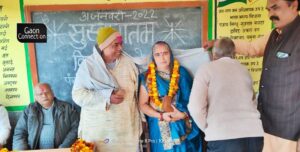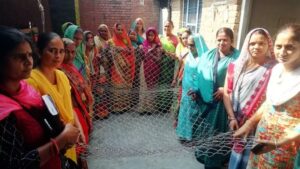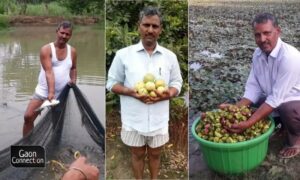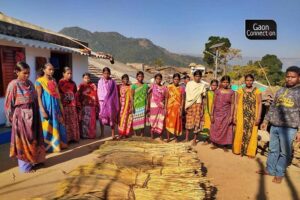At a time when large swathes of rural India were economically crippled by the COVID-19 pandemic, Rahu, a tribal village in Melghat area of Amravati district of Maharashtra stood as a beacon of hope. One hundred and seventy five households of Rahu received Rs 10,000 each from its gram sabha to tide over the lockdown period comfortably. The remaining 20 opted for another scheme.
In the past five years, Rahu has earned over Rs 3 crore from the forest under its community forest resource rights. These rights were accorded to the village’s gram sabha as per The Scheduled Tribes and Other Traditional Forest Dwellers (Recognition of Forest Rights) Act, 2006, commonly known as the Forest Rights Act, or FRA. In the time of need, this money was shared with the community. Moreover, last year, about 100 families also recorded a collection of one quintal of mahua flowers each.
About a 100 kilometres from Rahu is Payvihir, another village in the foothills of Melghat, which benefited from community forest resource (CFR) rights. Twenty villagers were given interest-free loans from money earned from CFR to buy livestock during the pandemic.
The noteworthy work done by the communities in Rahu and Payvihir have been highlighted in the recently-released ‘Extraordinary Work of Ordinary People’ by Pune-based Vikalp Sangam, an initiative that documents grassroots’ initiatives.
“If we didn’t have community forest resource rights, we wouldn’t have been able to give ten thousand rupees to every family in the village,” the soft-spoken Thannu Sawaji Darsimbe, 40, secretary of Rahu’s gram sabha, told Gaon Connection over phone, while recounting his village’s battle against COVID-19.
The community forest resource rights enabled Rahu and several other villages in the foothills of Melghat to overcome challenges posed by the pandemic. “We earned thirty lakh rupees from the sale of NTFP [non-timber forest produce], particularly bamboo. In March last year, we decided to share our profits, and transferred ten thousand rupees to the bank accounts of women in the village,” Darsimbe said.
Their reasoning was that men would spend the money on alcohol. “This is a very decent sum of money for those living in villages; so, it helped everyone a lot,” he explained.
How Melghat handled the fallout of the pandemic
Melghat, which literally means ‘meeting of ghats’, is dotted with cliffs and rocky ravines. Situated in the Satpura hill ranges, it was declared a Tiger Reserve in 1974. An adivasi region, it is home to several tribes such as Korku, Balai, Nihal and Gond. There are around 350 villages in Melghat region, and Purnima Upadhyay of non-profit Khoj, which works in the region, told Gaon Connection that about 100 of these villages could overcome the crisis due to community forest resource rights.
The pandemic did not really interrupt life, for aided by community forest resource rights, an active gram sabha and a robust youth team, forest villages in Melghat managed the COVID-19 crisis well. In Rahu and Payvihir, largely inhabited by the Korku and Balai tribes, very few people own land. A majority of them till others’ land or depend on the forest. In the absence of employment opportunities, they also migrate to cities to work on construction sites.
But community forest rights under the Forest Rights Act, 2006, have been a game changer. In 2016, Rahu got community forest resource rights for 1,343 hectares of forest. Along with rights under the Panchayat Extension to Scheduled Area (PESA) Act, it manages about 4,500 hectares and the gram sabha earned Rs 3 crore from the sale of bamboo and Rs 10 lakh from tendu leaves. During the pandemic, the money was shared by giving Rs 10,000 each to its 175 families.
Similarly, in 2012, Payvihir was granted community forest resource rights for around 190 hectares of forest land. In 2017, Khatijapur, Upatkheda and Kumbiwagholi villages collectively recorded a turnover of Rs 5 lakh from the sale of 10 tonnes of custard apple, under the brand Naturals Melghat.
According to Amit Sonare, 35, a gram sabha member and one of the founders of the youth team at Payvihir, the gram sabha was left with Rs 1 lakh from the sale of custard apples, which was used to help 20 villagers buy livestock. They were given an interest-free loan, which they will repay once the cattle turn productive.
“Our main NTFP [non-timber forest produce] is custard apple, and in 2019, we had no yield due to less rain and fire. We didn’t earn much from NTFP last year, but we distributed masks and sanitisers for three months to every family in the village,” Sonare told Gaon Connection.
“During Corona, nobody borrowed money or faced any grave financial distress,” Asha Bai, 35, a gram sabha member from Payvihir told Gaon Connection. “Harvesting of tendu leaves [used to roll beedis], which goes on for almost twenty or twenty five days is a means of income for a few landless families in the village. Two people working together can make anywhere between two and three hundred rupees every day, and it was the same during the pandemic,” she informed.
Sonare told Gaon Connection: “What happened due to community forest resource rights is increased awareness about our rights, responsibility and duty. Our gram sabha has started to meet often and discuss serious issues.”
“From sanitisation and checking at the village entrance to quarantine and social distancing, everything was managed well by the village during the lockdown. Work was made available for people in jungles,” Purnima Upadhyay of non-profit Khoj, which works in the region, told Gaon Connection.
Since both Rahu and Payvihir had sufficient funds, they could also afford to hire two teachers from within the village to conduct classes for children in the open during the pandemic.
“Schools did not function but the community conducted classes for children. This way, they didn’t lose out on studies, and were also able to help their parents,” added Upadhyay. In 2012, Khoj helped Payvihir bring around 190 hectares of barren land under the ambit of community forest rights.
Reduced migration
India’s forests have been home to tribal communities for centuries. The Forest Rights Act (FRA) was passed in 2006 to recognise the rights of forest dwelling communities to forest resources. It has provided dignity and livelihood to the community and enabled them to nurture their culture. These rights have put the onus of protection and conservation of jungles on these communities. It has also empowered the gram sabhas to take decisive steps about the welfare of their forests.
Access to forests and community forest resource rights has resulted in reduced migration from these villages. “Now, people don’t go outside to work as we have been able to generate work in the village and forest,” said Asha Bai.
According to Sonare, only 40 of the 113 households in Payvihir own land. The rest work as farm labourers. Mangrai Tandil, 50, who belongs to the Korku tribe, doesn’t own any land. An active member of the women’s self-help group in the village, she runs the government ration shop, which functioned through the pandemic.
“We followed strict rules. Only one person was allowed in the shop and a mask was mandatory,” Tandil told Gaon Connection. “Once upon a time, our village used to be empty. People would come back from cities only during festivals, but now we have work in the village so nobody goes out. It is because of our jungles. Earlier, our jungles were dry. Now, they are green again,” she added.
“We have planted amla [Indian gooseberry] and sitaphal [custard apple]. We also harvest tendu. Though it doesn’t yield much, it gives us something. Jungle hain to hum hain [we exist because of the jungles],” Tandil added.
Towards an eco-village
In the past few years, Payvihir, with its focus on sustainability and employment, has emerged as an eco village. In 2014, it also received the Biodiversity Award from the United Nations Development Programme (UNDP) for greening the 190 hectares of community forest resource rights land.
Payvihir has a biogas plant and drip irrigation system, and supports organic cultivation of mango, custard apple, amla, imli and jamun.
The efforts of water conservation, forest conservation and soil conservation have generated a lot of work for the community. “Nobody had to go out looking for work during the pandemic. Everyone has remained safe in the village till now,” Sonare added.



















